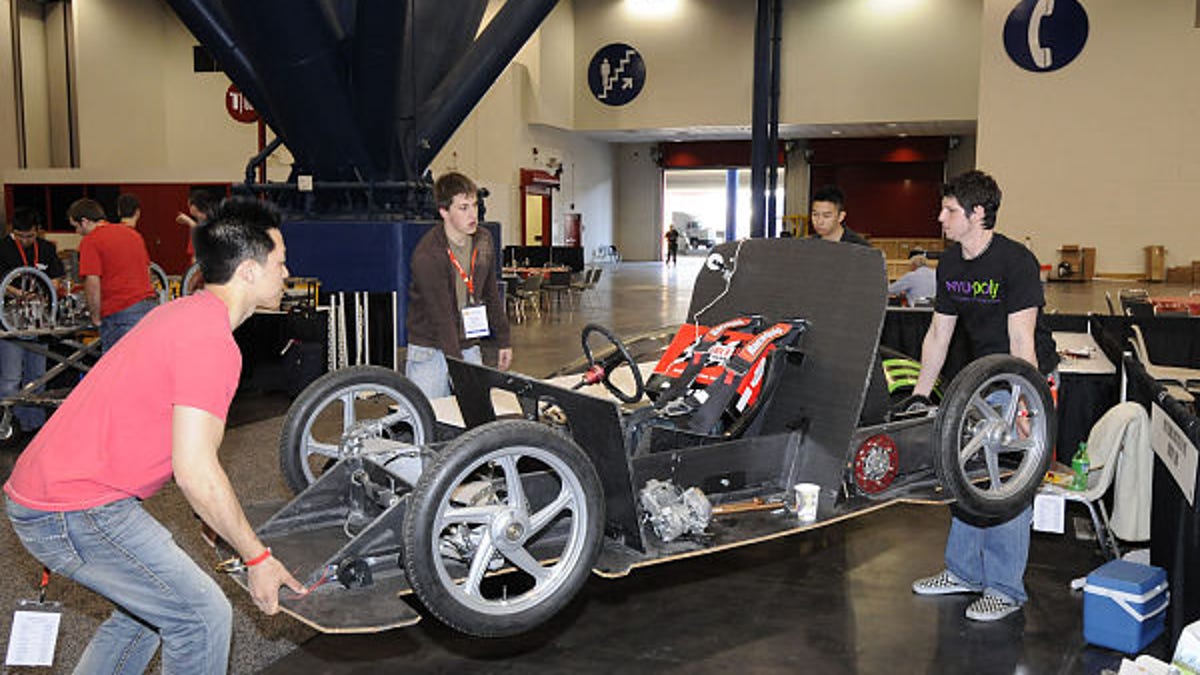At Eco-Marathon, going for 2,500 mpg--or more
High school and college students will be vying for the bragging rights that come with designing and building the most fuel-efficient vehicle.

If you're walking the streets of Houston this week and happen upon a group of very strange, oddly-shaped vehicles, there's a good chance you'll have wandered into the future of efficient cars.
From April 14 to 17, Shell is hosting the Eco-Marathon, a competition that tasks high school and college students with designing, building, and testing highly energy-efficient vehicles.
And the goal that every team that entered the Eco-Marathon is out to achieve this year? To beat last year's winning team, from Laval University in Quebec, Canada, which built a car that gets 2,487.5 miles per gallon.
The competition--something Shell also runs in Europe and Asia during other parts of the year--gives student teams a choice: they can build a vehicle that has an internal combustion engine, or one that is a plug-in electric. As well, they have to choose between a prototype or an urban concept vehicle.
Urban concept vehicles, said Mark Singer, the global project manager for the Eco-Marathon, are those that pretty closely resemble the cars that already clog our roads. Prototypes are "more torpedo-like," Singer said, and are usually more fuel efficient and streamlined than those from the first category. The prototypes are generally more efficient, he said, because they are lighter than those in the urban concept category.
Related links
• At Eco-marathon, teen driving team races to 2,843 mpg
• Photos: At Eco-marathon, a race to burn less fuel
• Photos: Revving up for the Eco-marathon
In recent years, the Eco-Marathon has focused mainly on the prototypes, but Singer said that Shell added the urban concept category to the mix this year because of a sense that such cars are more practical and have more applicability in today's automotive environment. The prototypes, he said, may be sleek and efficient, but are generally not very comfortable to ride in.
On the other hand, they do get a great deal better mileage. The winner in last year's urban category got 437.2 miles per gallon equivalent, Singer said, a figure that blows away any production car available today, but which pales in comparison to the nearly 2,500 miles a gallon figure turned in last year by the winning Quebec team.
Singer said the competition is interesting each year because of the improvements the teams make over previous years' entrants. In particular, he said, teams are getting smarter each year about the weight of the vehicles, and are coming up with more aerodynamic designs as well.
At the same time, the students are also becoming more savvy about how they drive the Eco-Marathon course, allowing them to gain efficiency. "One of the first things students ask for," Singer said, "is the topography of the course so that they can learn where the inclines are, and where the declines are."
In other words, the students want to know how best to drive the course to maximize fuel efficiency.
This week, Shell is expecting 77 teams to participate in Houston, but is also expecting 200 teams for the European competition from May 26 to 28, and about 100 during the Asian Eco-Marathon from July 6 to 9.
And why does Shell put its time and energy, so to speak, into the project? Singer said the company has found value in working with schools and universities and watching those institutions start to build energy efficiency programs into their curriculums. And, he said, the Eco-Marathon is a rare opportunity for students and educators to work on the design, mechanical, and electrical elements of their vehicles, rather than just one or two of those.
The Eco-Marathon, Singer said, allows students to work on their "vehicle from start to finish and creates that holistic approach to project development."

